Hospitality and Nature in Brazil
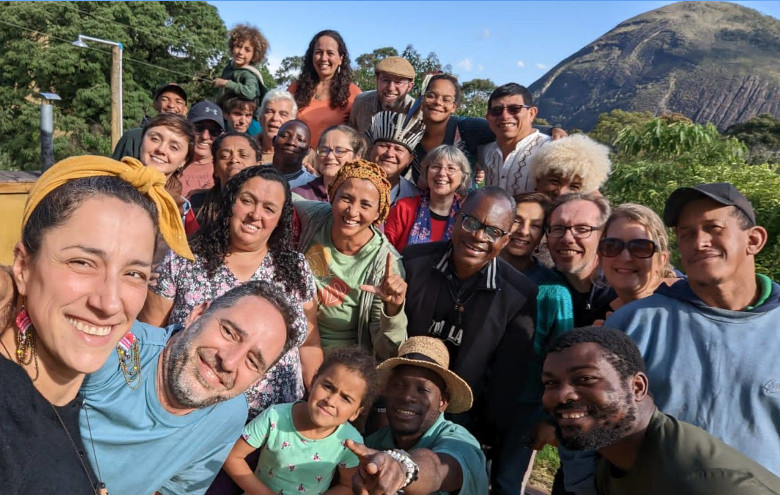
A meeting in Brazil
In November 2022, ATD Fourth World members from seven countries met in Mirantão, a town in southeast Brazil.
In this article, Mariana Guerra — an ATD Fourth World Volunteer Corps member in Brazil and one of the organizers — describes the participants’ experiences. Hospitality, nature, abundance, and life were the central themes of this meeting.
Exploring, sharing, and connecting
Almost 40 people from Africa, the Caribbean, Latin America and Europe came together in Brazil to share moments of warmth, exploration, and reflection on the last ten years of building ATD Fourth World in Brazil. During the 10-day event, the group formed strong bonds, shared their experiences, and connected with each other and local communities.
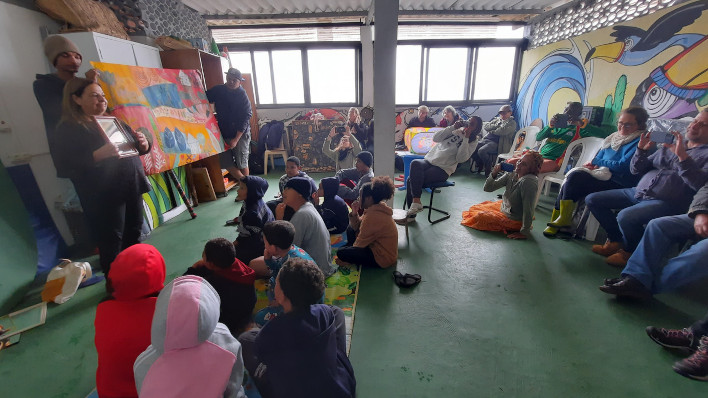
The first days of the meeting took place in Petrópolis. The group gathered in Morro dos Anjos to visit the community and participate in the Street Library, which Malena Justo and João Guilherme Simpolis now run. They shared their motivation for running the program with the group:
“As children, we were participants of the Street Library, which was a very important part of our lives. We want to offer that to the girls and boys of this generation.”
Tatiane Soares de Jesus — a member of ATD Fourth World — and her daughter, Vitoria, invited the group to lunch at their house, where they served traditional Brazilian food. The group also visited the historical center and was welcomed by ATD Fourth World Petrópolis members at dinner one evening.
In addition to their urban presence, ATD Fourth World is also present in rural areas. A significant part of the international meeting occurred in Mirantão, in the interior of Minas Gerais, where the first ATD Fourth World Volunteer Corps members settled in 2007.
A collective experience
The gathering was organized as a collective experience, promoting immersion in the community’s daily life with the aim of experimentally demonstrating how the members of ATD Fourth World built a movement in Brazil. As Mariana Guerra describes:
“Our presence in the community came about in a very natural way: we came to be a part of the life of the place. Looking back at our 10 years’ presence — our journey, challenges, and achievements — was very hard because we were so immersed. It was necessary to analyze together with others. That’s why it was important to cross paths with others — to share experiences and viewpoints to understand and reflect on what we have lived through.”
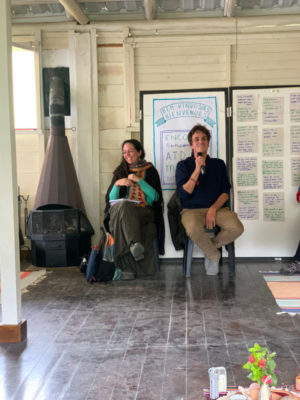
In this vein of becoming integrated into the community, during their time in Mirantão, the participants sowed seeds, made crafts, took part in rituals, hiked, cooked, and exchanged ideas and emotions with members of the community and each other. They connected with nature, one another, themselves, and the community.
Mariana explains, “It was essential to create spaces and situations where each person could reconnect with their own experiences and, from there, look at, connect, and reflect upon our combined experiences. It was also important to connect with where we were. Getting to know the neighbors — learning about how they live, understanding how they see the world, and discovering their day-to-day life — was an important part of the program. We are based in a milk-producing region, and few people know that the farmers get up at four in the morning, work hard, milk the cows, take it to the factory… Many people only see milk cartons in the market and know nothing about the lives of those who produce them.
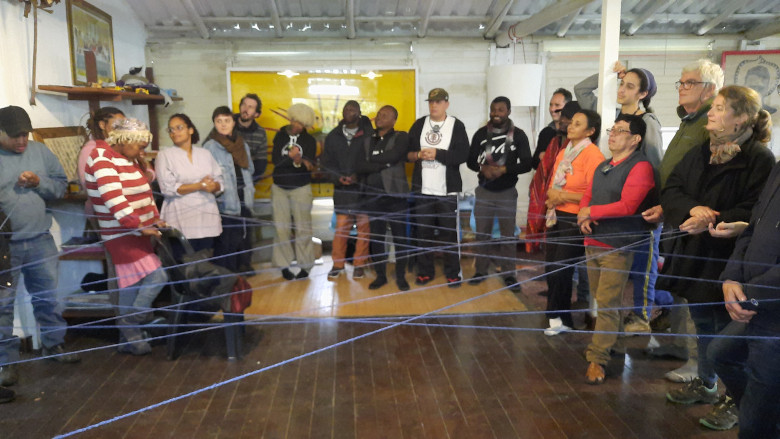
Hospitality
Knowing how to greet and welcome others is undoubtedly one of the key values of Brazilian society. But it’s also the case that the inhabitants of Mirantão have an exceptional sense of hospitality. This could be appreciated in every detail of the event and in the enthusiasm of the group responsible for preparation. As evidenced by Doña Donga, who during the planning of the event, said:
“I want to welcome everybody; there’s room for everybody at my house!” and she hosted thirty people for coffee.
The event was prepared intensely and meticulously. Mariana Guerra explains that hospitality and welcoming others into the community are integral to community living: “People like to host others; they love to prepare and get themselves ready to receive visitors. We organized a planning group for this event, where we thought of the best foods we knew how to make and everything we could offer. We prepared the menus, and we planned group activities. Also, we created workshops to exchange experiences so the participants could learn from each other and the people of Mirantão could share their knowledge.”
Seeing that some of the organizers were overburdened, other women from the community spontaneously joined in to help with the event. They assumed responsibilities, and their collaborative approach and willingness to share duties inspired others to help organize and get involved in the event.
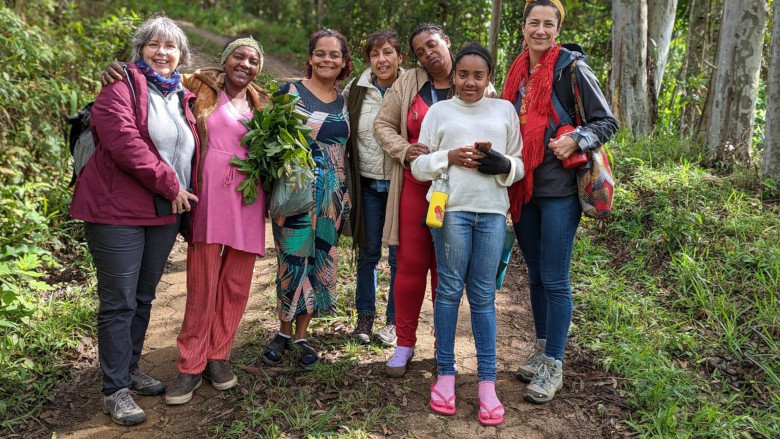
Nature and abundance
The event’s setting was vibrant, with waterfalls, forests, spectacular colored flowers, and a great diversity of plants and fertile lands. The landscape provided a point of reflection for participants coming from other places. Because of the similarities and differences, many participants compared this setting to their places of origin.
These moments of awareness of different realities constantly occurred, and each discovery was a cause for celebration. Participants connected through these shared experiences.
Horses
In Mirantão, the most popular means of transportation, until very recently, was the horse. While almost all the valley’s inhabitants have horses, one of the participants saw them for the first time in his life. What for some people was utterly mundane; for others, it was something completely new.
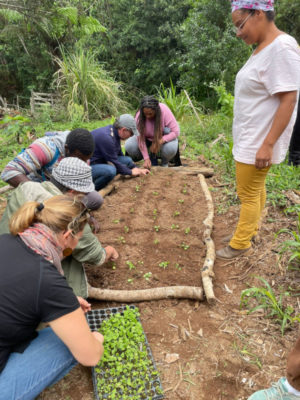 These experiences created favorable conditions for discussing a second topic addressed during the meeting: “Life in abundance.” Based on the concept of a gift economy1 — and a shared belief that the more you give, the more you have — they created a greenhouse to donate seeds. Members of ATD Fourth World also presented an agroforestry system2 They also created and shared methods of planting and cultivating.
These experiences created favorable conditions for discussing a second topic addressed during the meeting: “Life in abundance.” Based on the concept of a gift economy1 — and a shared belief that the more you give, the more you have — they created a greenhouse to donate seeds. Members of ATD Fourth World also presented an agroforestry system2 They also created and shared methods of planting and cultivating.
During this time, it was possible to see how agroforestry is an organic and self-organizing solution that positively entwines all life. Mariana Guerra explains: “It’s a system that can respond to the difficulties posed by planting. We cultivate this land and distribute the fruits of the harvest. It offers the practical advantage of not having to weed constantly.” It also prevents a monoculture of natural life, which ensures a thriving ecosystem.
At this stage, all the participants planted together, experiencing “mutirões”: collective actions of solidarity, where people plant in the fields of others to share the crops. The farmers also described their own daily experiences of “mutirões,” and during the subsequent discussion, they were able to answer questions that emerged from the shared experience.
Life, in the center
Throughout, participants explored the meaning of the word “nature”: many regarded nature as something that exists outside of themselves and did not perceive being part of it. They separated nature from human beings, meaning an integrated approach is not easy to understand.
Nature is intrinsic to life, but some obstacles make it difficult to perceive that our life depends on an integrated perspective. On the last day, participants discussed this challenge. Mariana Guerra reviews:
“In conclusion, we saw that life is at the center of everything. But life is not only that of the human being, it is also the life of the planet. Human rights are not the only rights. There are also the rights of the planet, the rights of the land…”
They also identified that education is essential to cultivate an integrated approach with nature: how else do we identify that our lives are a part of a global life, that we all live in an intertwined systemic network? People need training to be able to look at it this way. We must educate ourselves to see the consequences of climate change on the lives of people in poverty.
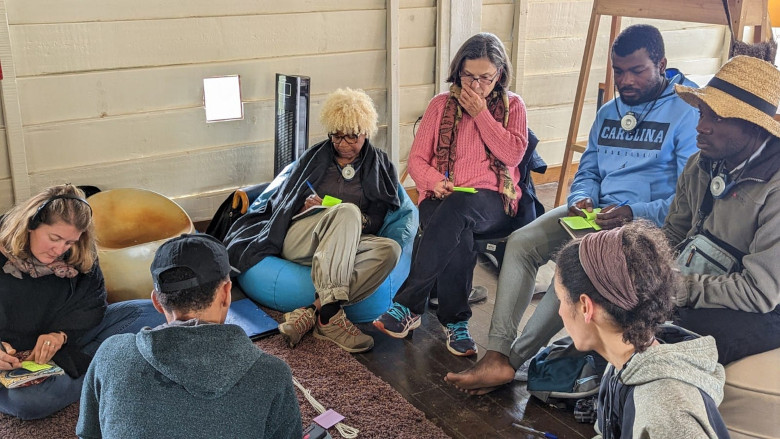
Concluding thoughts
Upon returning to their home countries, some participants described the 10-day event as transformative. One participant explains:
“The way they organized the meeting really perplexed me because it is not my way of thinking, but I leave here changed.”
The connections and exchanges between people made it possible to think and work profoundly, thus allowing participants to redefine social injustice and environmental justice. The ideas shared by participants showed the interconnectivity of these topics — generated by a system of production and consumption — and pointed to new challenges that ATD Fourth World must face to make living the center and priority of our contemporary societies.
ATD Fourth World facebook page
- A system of exchange where objects and labor are not sold but given freely without the expectation of reimbursement.
- A land management strategy that deliberately combines agriculture with trees. Planting trees, shrubs, and hedges on farms has many benefits, from ensuring healthier soil and higher yields, to providing habitats for natural fauna and insects.

